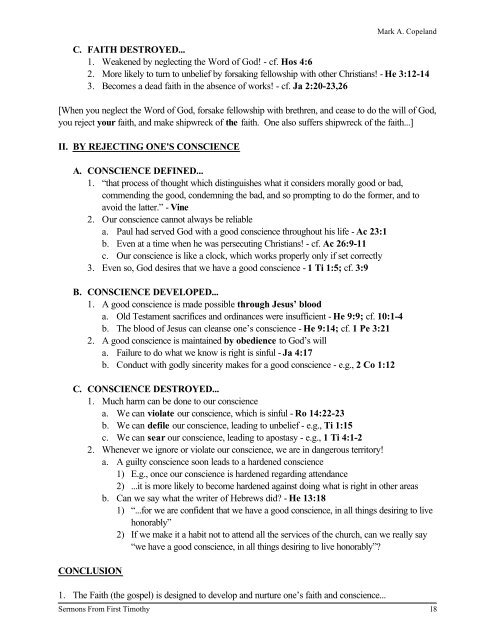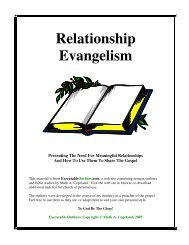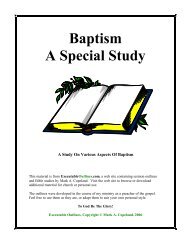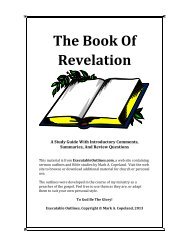The First Epistle To Timothy - Executable Outlines
The First Epistle To Timothy - Executable Outlines
The First Epistle To Timothy - Executable Outlines
Create successful ePaper yourself
Turn your PDF publications into a flip-book with our unique Google optimized e-Paper software.
C. FAITH DESTROYED...<br />
1. Weakened by neglecting the Word of God! - cf. Hos 4:6<br />
2. More likely to turn to unbelief by forsaking fellowship with other Christians! - He 3:12-14<br />
3. Becomes a dead faith in the absence of works! - cf. Ja 2:20-23,26<br />
[When you neglect the Word of God, forsake fellowship with brethren, and cease to do the will of God,<br />
you reject your faith, and make shipwreck of the faith. One also suffers shipwreck of the faith...]<br />
II. BY REJECTING ONE'S CONSCIENCE<br />
A. CONSCIENCE DEFINED...<br />
1. “that process of thought which distinguishes what it considers morally good or bad,<br />
commending the good, condemning the bad, and so prompting to do the former, and to<br />
avoid the latter.” - Vine<br />
2. Our conscience cannot always be reliable<br />
a. Paul had served God with a good conscience throughout his life - Ac 23:1<br />
b. Even at a time when he was persecuting Christians! - cf. Ac 26:9-11<br />
c. Our conscience is like a clock, which works properly only if set correctly<br />
3. Even so, God desires that we have a good conscience - 1 Ti 1:5; cf. 3:9<br />
B. CONSCIENCE DEVELOPED...<br />
1. A good conscience is made possible through Jesus’ blood<br />
a. Old Testament sacrifices and ordinances were insufficient - He 9:9; cf. 10:1-4<br />
b. <strong>The</strong> blood of Jesus can cleanse one’s conscience - He 9:14; cf. 1 Pe 3:21<br />
2. A good conscience is maintained by obedience to God’s will<br />
a. Failure to do what we know is right is sinful - Ja 4:17<br />
b. Conduct with godly sincerity makes for a good conscience - e.g., 2 Co 1:12<br />
C. CONSCIENCE DESTROYED...<br />
1. Much harm can be done to our conscience<br />
a. We can violate our conscience, which is sinful - Ro 14:22-23<br />
b. We can defile our conscience, leading to unbelief - e.g., Ti 1:15<br />
c. We can sear our conscience, leading to apostasy - e.g., 1 Ti 4:1-2<br />
2. Whenever we ignore or violate our conscience, we are in dangerous territory!<br />
a. A guilty conscience soon leads to a hardened conscience<br />
1) E.g., once our conscience is hardened regarding attendance<br />
2) ...it is more likely to become hardened against doing what is right in other areas<br />
b. Can we say what the writer of Hebrews did? - He 13:18<br />
1) “...for we are confident that we have a good conscience, in all things desiring to live<br />
honorably”<br />
2) If we make it a habit not to attend all the services of the church, can we really say<br />
“we have a good conscience, in all things desiring to live honorably”?<br />
CONCLUSION<br />
1. <strong>The</strong> Faith (the gospel) is designed to develop and nurture one’s faith and conscience...<br />
Mark A. Copeland<br />
Sermons From <strong>First</strong> <strong>Timothy</strong> 18

















